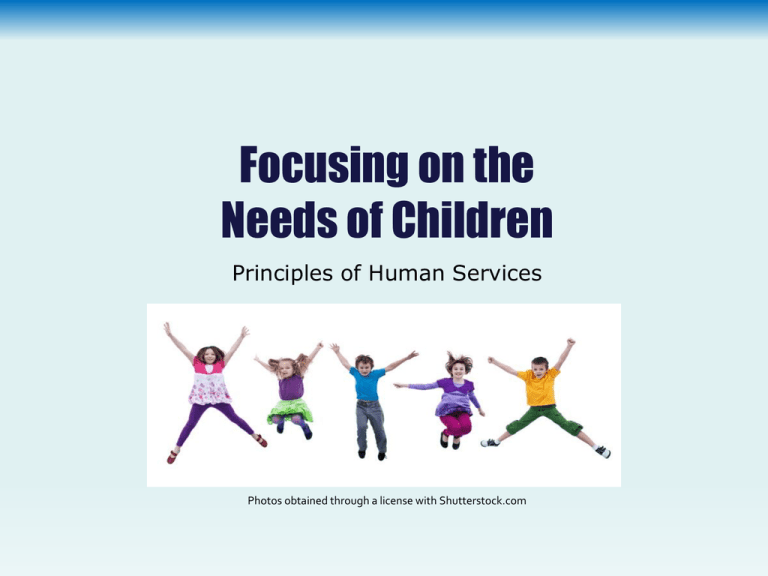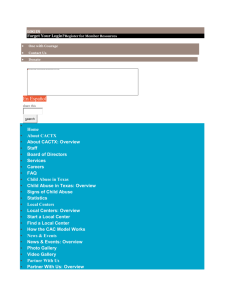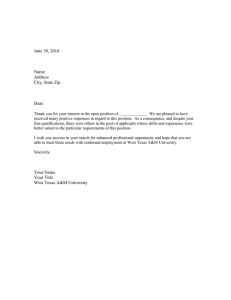
Focusing on the
Needs of Children
Principles of Human Services
Photos obtained through a license with Shutterstock.com
Copyright
Copyright and Terms of Service
Copyright © Texas Education Agency, 2014. These materials are copyrighted © and trademarked ™
as the property of the Texas Education Agency (TEA) and may not be reproduced without the express
written permission of tea, except under the following conditions:
1) Texas public school districts, charter schools, and education service centers may reproduce and
use copies of the materials and related materials for the districts’ and schools’ educational use without
obtaining permission from TEA.
2) Residents of the state of Texas may reproduce and use copies of the materials and related
materials for individual personal use only, without obtaining written permission of TEA.
3) Any portion reproduced must be reproduced in its entirety and remain unedited, unaltered and
unchanged in any way.
4) No monetary charge can be made for the reproduced materials or any document containing them;
however, a reasonable charge to cover only the cost of reproduction and distribution may be charged.
Private entities or persons located in Texas that are not Texas public school districts, Texas education
service centers, or Texas charter schools or any entity, whether public or private, educational or noneducational, located outside the state of Texas must obtain written approval from tea and will be
required to enter into a license agreement that may involve the payment of a licensing fee or a royalty.
Contact TEA copyrights with any questions you may have.
Copyright © Texas Education Agency, 2014. All rights reserved.
2
What are the needs of children?
3
Copyright © Texas Education Agency, 2014. All rights reserved.
Basic Needs of Children
•
•
•
•
Intellectual
Emotional
Physical
Social
4
Copyright © Texas Education Agency, 2014. All rights reserved.
Responsibilities of Caregivers
• Meet nutritional and
educational needs
• Provide a safe,
nurturing
environment
• Well-trained in first
aid and CPR
Photos obtained through a license with Shutterstock.com
5
Copyright © Texas Education Agency, 2014. All rights reserved.
Developmentally Appropriate
Guidance Techniques
A child’s environment
should be:
•
•
•
•
Comfortable
Safe
Secure
Stable
Photos obtained through a license with Shutterstock.com
6
Copyright © Texas Education Agency, 2014. All rights reserved.
Promoting Positive Behavior
Positive behaviors include:
• Encouraging initiative
• Getting along with
others
• Pro-social skills
• Self-control
• Setting appropriate limits
Photos obtained through a license with Shutterstock.com
7
Copyright © Texas Education Agency, 2014. All rights reserved.
What is child abuse?
8
Copyright © Texas Education Agency, 2014. All rights reserved.
Child Abuse and Neglect
Last year:
• 231 Texas children died because of
abuse or neglect at the hands of their
parents or guardians
• 65,948 children were confirmed victims
of abuse or neglect
Source: Helpandhope.org
9
Copyright © Texas Education Agency, 2014. All rights reserved.
National Child Abuse Statistics
Source: Childhelp.org
10
Copyright © Texas Education Agency, 2014. All rights reserved.
Child Maltreatment
Includes:
•
•
•
•
Emotional abuse
Neglect / Abandonment
Physical abuse
Sexual abuse
11
Copyright © Texas Education Agency, 2014. All rights reserved.
Factors Affecting Child Abuse
•The child’s age and developmental
status when the abuse or neglect
occurred
•The frequency, duration and
severity of abuse
•The relationship between the
victim and his or her abuser
•The type of abuse (emotional,
physical, sexual or abandonment)
Photos obtained through a license with Shutterstock.com
12
Copyright © Texas Education Agency, 2013. All rights reserved.
Emotional Abuse
May include:
• Constant criticism
• Threats
• Rejection
• Withholding love, support or guidance
13
Copyright © Texas Education Agency, 2014. All rights reserved.
Neglect / Abandonment
Photos obtained through a license with Shutterstock.com
A child is considered to be
abandoned when the:
• child has been left alone in
circumstances where the child
suffers serious harm
• parent has failed to maintain
contact with the child or
provide reasonable support for
a specified period of time
• parent’s identity or
whereabouts are unknown
14
Copyright © Texas Education Agency, 2014. All rights reserved.
Physical Abuse
Physical abuse: The physical injury of one
person by another through such behavior
as hitting, kicking, biting or throwing objects
Physical Abuse
15
Copyright © Texas Education Agency, 2014. All rights reserved.
The Kelsey Briggs Story.
(True Story Original)
(click on link)
16
Copyright © Texas Education Agency, 2014. All rights reserved.
Sexual Abuse
Sexual abuse: A form of abuse in
which one person forces another to
engage in sexual activities.
Photos obtained through a license with Shutterstock.com
17
Copyright © Texas Education Agency, 2014. All rights reserved.
Sexual Abuse
Five Steps to Protect Our Children
Step 1 – Learn the Facts
Step 2 – Minimize Opportunity
Step 3 – Talk About It
Step 4 – Recognize the Signs
Step 5 – React Responsibly
Five Steps to
Protect Our
Children
(click on link)
Copyright © Texas Education Agency, 2014. All rights reserved.
18
Behavioral Consequences of
Child Abuse
Children who experience
maltreatment are at an
increased for:
• Alcoholism
• Criminal record and
behavior
• Delinquency
• Drug abuse
• Engagement in highrisk sexual behaviors
• Not graduating from
school
• Low academic
achievement
• Smoking
• Teen pregnancy
Copyright © Texas Education Agency, 2014. All rights reserved.
19
Consequences of Child Abuse
Child may experience:
• Increased risk for adverse
health effects
• Learning difficulties
• Memory difficulties
• Post-traumatic stress
disorder
• Psychiatric disorders
• Severe or fatal head trauma
such as Shaken Baby
Syndrome
• DEATH!!!
20
What is domestic violence?
21
Copyright © Texas Education Agency, 2014. All rights reserved.
Domestic Violence
Phase 3 Honeymoon
Phase I –
Tension
Phase 2 –
Incident
Source: Domestic Violence Roundtable
Copyright © Texas Education Agency, 2014. All rights reserved.
22
Domestic Violence
(click on link)
23
Copyright © Texas Education Agency, 2014. All rights reserved.
Skills and Resources Available
to Address Abuse
24
Copyright © Texas Education Agency, 2014. All rights reserved.
Child Protective Services
Division of Texas
• Investigating reports of abuse and
neglect of children
• Providing services to children and
families in their own homes
• Placing children in foster care.
• Providing services to help youth in
foster care make the transition to
adulthood
• Placing children in adoptive
homes
25
Copyright © Texas Education Agency, 2014. All rights reserved.
Reporting Suspected Abuse and Neglect
Child Abuse and Neglect Reporting
and Requirements
(click on link)
26
National Child Abuse Hotline
(click on picture)
27
Copyright © Texas Education Agency, 2014. All rights reserved.
How to Help Someone in Need
• Don’t be afraid to let the
person know that you are
concerned for his or her
safety.
• Acknowledge that he or
she is in a very difficult
and scary situation.
• Be supportive.
• Be non-judgmental.
28
Copyright © Texas Education Agency, 2014. All rights reserved.
Help for Parents. Hope for Kids
Help and Hope
(click on link)
Copyright © Texas Education Agency, 2014. All rights reserved.
29
Picture Door Organizer
Picture Door Organizer
(click on link)
Copyright © Texas Education Agency, 2014. All rights reserved.
30
Questions
31
Copyright © Texas Education Agency, 2014. All rights reserved.
References and Resources
Images:
•
Microsoft Clip Art: Used with permission from Microsoft.
•
SIRDC Shutterstock subscription 2014 – 2015
Textbook:
•
Decker, C. (2011). Child development: Early stages through age 12. (5th ed.). Tinley Park: Goodheart-Willcox Company.
Websites:
•
Child Abuse and Neglect
Source: This site, from a bureau of the U.S. Department of Health and Human Services, provides links to basic
information about child abuse and neglect and too many other sites and publications that provide more detailed
information and help. (Child Welfare Information Gateway)
http://www.childwelfare.gov/can/
•
Childstats.gov
This website provides information on key indicators in seven domains: family and social environment, economic
circumstances, health care, physical environment and safety, behavior, education, and health.
http://www.childstats.gov/americaschildren/famsoc7.asp
•
National Abuse Hotline
Source: The National Domestic Violence Hotline receives more than 23,500 calls per month from victims, survivors,
friends and family members, law enforcement personnel, domestic violence advocates and the general public. Hotline
advocates provide support and assistance to anyone involved in a domestic violence situation, including those in samesex relationships, male survivors, those with disabilities and immigrant victims of domestic violence. All calls to the
National Domestic Violence Hotline are anonymous and confidential.
http://www.thehotline.org/
•
National Center for Children Exposed to Violence
Source: Relevant websites, statistics, reports, books, and journal articles
http://www.nccev.org/violence/domestic.html
•
National Coalition Against Domestic Violence
Source: The National Coalition Against Domestic Violence is “a grassroots non-profit membership organization working
since 1978 to end violence in the lives of women.
http://ncadv.org
32
Copyright © Texas Education Agency, 2014. All rights reserved.
References and Resources
•
Prevent Child Abuse Texas
Source: Prevent Child Abuse Texas (PCATX)
Is a statewide non-profit organization working to prevent child abuse and neglect in all its forms throughout Texas. The work of the
organization depends solely on private grants and contributions. The organization is led by a statewide Board of Directors who
represent their regions through community agencies and organizations dealing with social issues affecting children.
http://www.preventchildabusetexas.org/vitialsdaily.html
•
Texas Child Protective Services
Investigating reports of abuse and neglect of children and providing services to children and families in their own homes.
https://www.dfps.state.tx.us/child_protection/
•
Texas Education Agency
Child Abuse and Neglect Reporting and Responsibilities
http://www.tea.state.tx.us/index4.aspx?id=25769803997
•
2012 Resource Guide—Preventing Child Maltreatment and Promoting Well Being: A Network for Action.
Resource Guide includes tip sheets for parents and caregivers, ways to get involved, and six protective factors.
http://www.childwelfare.gov
YouTube:
•
Childhelp National Child Abuse Hotline 1-800-4-A-CHILD
This hotline is staffed 24/7 by degreed counselors.
http://youtu.be/tQ5uzupV-q8
•
Darkness to Light: End Child Sexual Abuse
Five Steps to Protect Our Children
http://www.d2l.org/site/c.4dICIJOkGcISE/b.6143703/k.2746/The_5_Steps_to_Protecting_Our_Children.htm
•
Domestic Violence
This is a video made to help raise awareness of domestic violence.
http://youtu.be/xYWxfxMOUO4
•
The Kelsey Briggs Story. (True Story Original)
Kelsey Briggs lost her life before the age of three due to Child Abuse.
http://youtu.be/EzDP2IFztek
•
Picture Door Organizer
This organizer is a multi-purpose tool. The students can incorporate information, key terms, sequential events, graphics and concept
ideas. It has a hidden element that will make a presentation pop!
http://youtu.be/weY4PtrfM3o
33
Copyright © Texas Education Agency, 2014. All rights reserved.


